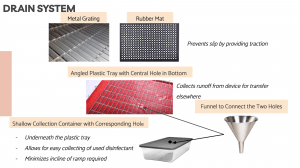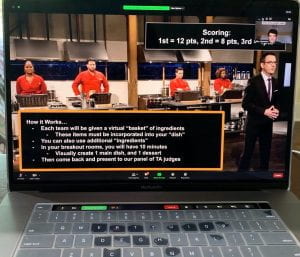Wow! These past five weeks have flown by; I can’t believe we only have one week left of this internship. It has been an excellent opportunity to expand my understanding of Global Health and the design process while getting to know some awesome people along the way! This week, in particular, had me considering my future career options not only in the field of Global Health, but overall.
It was really great to listen to Ms. Faith Mzandu, the Co-Founder of WomEng Malawi, discuss the challenges women might face within the field of engineering and how, in part, to overcome them. Throughout high school, many of my STEM classes had a majority of male students, which is something that is commonly found in the more science-based fields. From this, Ms. Mzandu encouraged us to find mentors who would help us to overcome the challenges posed by this minority status and would offer a layer of understanding from shared experiences. She also discussed the importance of encouraging younger females to pursue careers in STEM, and in turn, become their mentors and to help overcome this long-standing gender stereotype. I connected with a lot of what she said in her presentation about the role of gender roles in not only STEM-based fields but in life and the expectations that result from them. One thing that I really enjoyed about her presentation was the advice she posed to the male students: if you see women being regarded as lower status due to their gender, you should mention it. She didn’t suggest doing so in a radical manner, but instead making comments like: I had the opportunity to do ____ last time, I think that she would benefit from this experience and have some helpful insights. I appreciated this idea as it didn’t make a big scene or come off as abrasive; instead, it was a suggestion that might be more accepted while still decreasing the role of gender norms in the workplace.
When I thought about my future, I have always said that I wanted to be a doctor. The specialty has changed over the years, from an OBGYN, a pediatric surgeon, to a pediatric oncologist. However, looking forward now, so many other opportunities have been exposed to me, many of which are in the field of Global Health. I still believe that I want to go into medicine and become a doctor (something I’ve always dreamed of); however, I hope to have the opportunity to do research in the field of Global Health.
Moving on, last week was a week of many decisions concerning our final recommendations for our prototypes. For the Walk-Through Decontamination Unit, we decided to focus on the collection mechanism and the requirements necessary for the chemicals to be used safely. The collection mechanism, outlined in the image below, makes use of metal grating, a rubber mat, an angled plastic tray with a central hole in the bottom, a funnel, and a shallow collection container. This collection method works well with our idea of adding a ramp to make it more accessible for different populations of people and with not adding additional power demand to the device.
Regarding the necessary requirements for the safe use of chemicals in this device, we were stuck with a tough decision: indicate this device as hospital and lab use only, or find a way to make it safe for general public use. This stemmed from an issue that we have considered throughout this internship: the toxicity of chemicals. All chemicals that we could find that have been proven to be effective against COVID-19 have the risk of being potentially harmful to the user’s mucous membranes. In a lab or hospital use, the wearing of PPE while using the device mitigated this risk; however, we remained unsure how to make this device suitable for large scale public usage where PPE, such as face shields, is not as standard. Our final recommendation for this device ended up being that it is ideal in clinical settings, but if it is to be used in general public spaces, face shields and/or masks and drying sheets should be utilized. We hope to get a better understanding in the coming week of how these measures, or similarly effective measures, could be implemented cost-effectively.
Important decisions were also made for the Hand Sanitation Station device. Power demand has been a significant issue throughout this internship. We have looked into many different solutions ranging from 9V rechargeable batteries, to connection to the main power line, to solar panels. From our research, we concluded that it would be best to connect the devices to the main power line when possible. When it isn’t possible to connect to the main power line, it would be helpful to look into connection to solar power; however, this would only be cost-effective when a lot of devices were present. As a backup, all devices should contain a rechargeable 9V battery.
To end the week, our awesome TA’s set up a game show bonding activity. The first challenge was to create a meal and dessert from a list of ingredients that was given to us (instructions in the image below). This meal was required to have a Malawian and American cultural flair from the ingredients: hambo, marshmallows, cheese, Kamba Puffs, and Nsima. This was difficult, but Sana did a great job presenting our dish, and we got first place!
The next challenge was a talent show where each of us was offered the chance to present one of our talents for 3 points. Everyone in my group presented: Krystal with the neat ability to crack all her joints, Sana with her amazing art skills, Mwayi with her sewing skills, and me with my Chinese speaking skills. I didn’t really consider this a hidden talent, but my group really encouraged me, and it was fun to have a chance to speak Chinese outside the classroom atmosphere. The last challenge was a “most likely to” game. The TA’s presented a statement on Zoom, and each group had to, at the same time, text who in their group this statement applied to. Apparently, I’m the most likely to survive on a deserted island in the Infection Prevention team; however, I don’t think I’m going to put that to the test anytime soon hopefully. In the end, we won first place, and the TA’s relinquished control of the intern group chat to our team!
Signing off,
Kaitlyn Heintzelman

